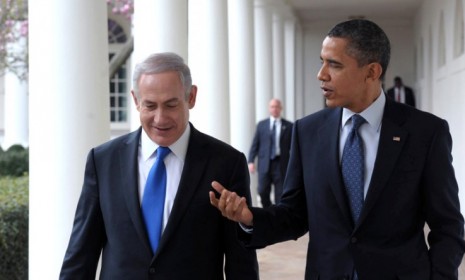Obama beat Bibi?
The most important story of the day


A free daily email with the biggest news stories of the day – and the best features from TheWeek.com
You are now subscribed
Your newsletter sign-up was successful
It's on page A9 of The New York Times. "Netanyahu Appears To Be Shifting Israel's Iran Policy Toward More Sanctions." The story appears to confirm a policy shift. It begins by noting that the Israeli Prime Minister plans to visit Europe late in the year to press for tighter EU sanctions against Iran. And it suggests that the time-frame for a possible Israeli strike against the country is not in the cards until at least mid-2013. That is, as the article notes, well after the U.S. election.
This means two things. Netanyahu lacks either the political credibility to strike Iran right now, that he lacks the resolve to do it without U.S. support, and that the sanctions appear to be working, insofar as they are giving the international community more time. The article suggests that Ehud Barak, the Israeli Defense Minister, has turned sharply away from the idea of a unilateral strike, convinced that maintaining a good relationship with the United States is a better guarantor of a nuclear-free Iran than anything Israel might do. Coincidentally, on page A8 of the Times, an article describes the astonishing 40 percent drop on the price of Iran's currency and Iranian President Mahmoud Ahmadinejad's pleas to his countryfolk not to trade their own money for dollars.
Also: President Obama's approach to Iran, messy as it may be, is bearing fruit. Iran is in chaos, and the world is following the lead of the United States. Bibi's bluster didn't work. Headed into next week's foreign policy debate, when Mitt Romney is sure to criticize Obama for the chaos in the Middle East and North Africa, Obama will have a clear (and partial) rebuttal at the ready.
The Week
Escape your echo chamber. Get the facts behind the news, plus analysis from multiple perspectives.

Sign up for The Week's Free Newsletters
From our morning news briefing to a weekly Good News Newsletter, get the best of The Week delivered directly to your inbox.
From our morning news briefing to a weekly Good News Newsletter, get the best of The Week delivered directly to your inbox.
A free daily email with the biggest news stories of the day – and the best features from TheWeek.com
Marc Ambinder is TheWeek.com's editor-at-large. He is the author, with D.B. Grady, of The Command and Deep State: Inside the Government Secrecy Industry. Marc is also a contributing editor for The Atlantic and GQ. Formerly, he served as White House correspondent for National Journal, chief political consultant for CBS News, and politics editor at The Atlantic. Marc is a 2001 graduate of Harvard. He is married to Michael Park, a corporate strategy consultant, and lives in Los Angeles.
-
 Political cartoons for February 15
Political cartoons for February 15Cartoons Sunday's political cartoons include political ventriloquism, Europe in the middle, and more
-
 The broken water companies failing England and Wales
The broken water companies failing England and WalesExplainer With rising bills, deteriorating river health and a lack of investment, regulators face an uphill battle to stabilise the industry
-
 A thrilling foodie city in northern Japan
A thrilling foodie city in northern JapanThe Week Recommends The food scene here is ‘unspoilt’ and ‘fun’
-
 The billionaires’ wealth tax: a catastrophe for California?
The billionaires’ wealth tax: a catastrophe for California?Talking Point Peter Thiel and Larry Page preparing to change state residency
-
 Bari Weiss’ ‘60 Minutes’ scandal is about more than one report
Bari Weiss’ ‘60 Minutes’ scandal is about more than one reportIN THE SPOTLIGHT By blocking an approved segment on a controversial prison holding US deportees in El Salvador, the editor-in-chief of CBS News has become the main story
-
 Has Zohran Mamdani shown the Democrats how to win again?
Has Zohran Mamdani shown the Democrats how to win again?Today’s Big Question New York City mayoral election touted as victory for left-wing populists but moderate centrist wins elsewhere present more complex path for Democratic Party
-
 Millions turn out for anti-Trump ‘No Kings’ rallies
Millions turn out for anti-Trump ‘No Kings’ ralliesSpeed Read An estimated 7 million people participated, 2 million more than at the first ‘No Kings’ protest in June
-
 Ghislaine Maxwell: angling for a Trump pardon
Ghislaine Maxwell: angling for a Trump pardonTalking Point Convicted sex trafficker's testimony could shed new light on president's links to Jeffrey Epstein
-
 The last words and final moments of 40 presidents
The last words and final moments of 40 presidentsThe Explainer Some are eloquent quotes worthy of the holders of the highest office in the nation, and others... aren't
-
 The JFK files: the truth at last?
The JFK files: the truth at last?In The Spotlight More than 64,000 previously classified documents relating the 1963 assassination of John F. Kennedy have been released by the Trump administration
-
 'Seriously, not literally': how should the world take Donald Trump?
'Seriously, not literally': how should the world take Donald Trump?Today's big question White House rhetoric and reality look likely to become increasingly blurred
